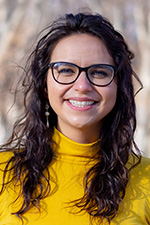Julieta Juncosa Calahorrano named UCAR Next Generation Fellow
Ph.D. student Julieta Juncosa Calahorrano has been selected as a 2021 Next Generation Fellow by the University Corporation for Atmospheric Research (UCAR). She was awarded the Earth Science fellowship as part of the program’s fifth cohort.
The Next Generation Fellowship gives financial and academic support to Earth system science students from historically underrepresented groups. UCAR will support the fellows with two years of graduate school funding. The fellows also will receive professional development and experience through summer internships with UCAR and the National Center for Atmospheric Research (NCAR). You can more about the fellowship and its three 2021 recipients here.
During the first summer, Juncosa Calahorrano will work with Alessandro Franchin and her CSU mentors to use a commercially available inertial inlet to separate particle- from gas-phase reactive nitrogen to get a true gas-phase measurement of oxidized nitrogen (NOy). The second summer, she will work with Gabriele Pfister on incorporating observations from the Transformation and Transportation of Ammonia (TRAN2AM) field intensive into the Weather Research and Forecasting model with chemistry (WRF-chem) to aid the interpretation of the observations and to validate and improve model outputs and parameterization.
“I am super excited for this opportunity and look forward to working with Ale and Gabi and getting to know the NCAR family better,” Juncosa Calahorrano said.
In her home of Quito, Ecuador, Juncosa Calahorrano was inspired to study environmental engineering as a solution to pollution of the local water and atmosphere. Her goal has been to better understand the processes that lead to pollution of natural systems and the ways informed policies can improve ecosystem and societal well-being. In particular, she was drawn to study air quality and atmospheric science.
Juncosa Calahorrano earned her bachelor’s degree in environmental engineering from Universidad San Francisco de Quito (USFQ), and a master’s degree in atmospheric science from Colorado State University (CSU). Now Juncosa Calahorrano is working toward her doctorate at CSU, where her research focuses on investigating the impacts and effects of reactive nitrogen in the atmosphere from wildfire smoke plumes and concentrated animal feeding operations. Her career goals are to be a professor and mentor the next generation of rising scientists while also making the atmospheric chemistry research in Latin America more globally visible.
During her fellowship, Juncosa Calahorrano will be utilizing the expertise and resources available at NCAR’s atmospheric chemistry laboratory for instrumentation testing and modeling capabilities.
“This fellowship will allow me to learn from a group of world-class scientists specializing in both atmospheric chemistry instrumentation and regional modeling,” said Juncosa Calahorrano. “Our goal is to develop a new technique that will better measure oxidized nitrogen, as well as incorporate measurements from a recent field campaign into an atmospheric chemistry model. This will ultimately help improve our knowledge of the impacts of reactive nitrogen.”



